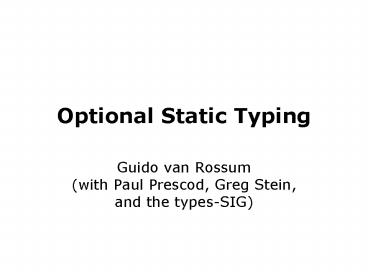Optional Static Typing - PowerPoint PPT Presentation
Title:
Optional Static Typing
Description:
Optional Static Typing. Guido van Rossum (with Paul Prescod, Greg Stein, and the ... reflection on types must be possible. How to spell arbitrary tuple of T: (T ... – PowerPoint PPT presentation
Number of Views:35
Avg rating:3.0/5.0
Title: Optional Static Typing
1
Optional Static Typing
- Guido van Rossum(with Paul Prescod, Greg Stein,
and the types-SIG)
2
Talk Overview
- Why add static type checking?
- Checked vs. unchecked modules
- Declaration syntax
- Type expressions
- Dynamic casts
- Parameterized types
- Open issues
- Implementation...?
3
Why Add Static Typing?
- Two separate goals
- faster code (OPT)
- better compile-time errors (ERR)
- Mostly interested in (ERR)
- (OPT) will follow suit
- Of course it will be optional
- and (mostly) backwards compatible
4
Checked vs. Unchecked
- A module is checked or unchecked
- no partially checked modules
- Checked modules are
- guaranteed not to raise runtime type errors
- except at point of call from unchecked modules
- except at explicit dynamic casts
- protected at runtime against violations by
unchecked modules - e.g. messing with __dict__ or assignment to
module globals or class/instance variables
5
Declaration Syntax
- Two forms inline and explicit
- explicit form is easy to remove
- Inline
- def gcd(a int, b int) -gt int ...
- Explicit (two variants)
- decl gcd def(int, int) -gt intdef gcd(a, b) ...
- def gcd(a, b) decl a int, b int decl
return int ...
6
Declaring Classes
- decl in class declares instance attributes
- (by default, anyway)
- can add syntax for private, protected etc.
- methods declared excluding self
- derived classes must play by the rules
- cant override methods w. conflicting types
- must call Base.__init__()
- once this exists, we can think about
require/ensures again!
7
Type Expressions
- standard types (in __builtin__)
- int, long, float, complex, str, tuple, list, dict
- int is same as types.IntType, etc.
- None (special case type value)
- standard abstract types (__builtin__)
- number, string, sequence, mapping, any
- class names
- may be imported from checked modules
- typedefs (decl myType P.M.Type)
8
Constructing Types
- Syntax for type composition
- list with items of type T T
- tuple of T1, T2, T3 (T1, T2, T3)
- (this explains why we have both tuples and
lists!) - dict with key/value types T1/T2 T1 T2
- union of types T1 and T2 T1 T2
- function (e.g.) def(T1, T2)-gtT3
- Example
- str (int, int) (int, int, str) None
9
Dynamic Casts
- Proposed by Greg Stein
- General syntax expression ! type
- Example x y ! int
- if y has type int assign y to x
- otherwise raise TypeError
- Problem
- must catch exception to decide union type
- Alternative typecase statement?
- no syntax proposal exists yet
10
Parameterized Types
- Needed e.g. for container classes
- class StackltTgtdecl st Tdef __init__(self)
self.st def push(self, x T)
self.st.append(x)def pop(self) -gt T x
self.st-1 del self.st-1 return x - decl IntStack Stackltintgt template
instantiation - decl s IntStack
- s IntStack() or s Stack() ???
- s.push(1)
- decl x int
- x s.pop()
- s.push("spam") ERROR
11
Parameterized Functions
- Example
- def bisectltTgt(a T, x T) -gt intdecl lo, mid,
hi intlo, hi 0, len(a)while lo lt hi mid
(lohi)/2 if x lt amid hi mid else
lo mid1return lo - decl a int
- Idea
- bisect() could be called without template
instantiation - argument types will be matched against the type
parameters ltTgt
12
Open Issues (1)
- A subclass is not always a subtype!
- int is a subtype of any, but int not of any
- similar for parameterized classes
- Dynamic cast or typecase statement?
- Should we declare exceptions? How?
- How much type inference is needed?
- Interface declarations?
- vardefaulttype -or- vartypedefault?
13
Open Issues (2)
- Access to type objects at runtime
- reflection on types must be possible
- How to spell arbitrary tuple of T (T)?
- Typedef syntax (in expressions?)
- Type conformance rules
- Syntax ambiguity for lambda
- How to spell the type of self
- Should classes be types? (Yes!)
14
Open Issues (3)
- Avoid NameError and AttributeError?
- Need flow analysis plus special rules
- e.g. all instance variables must be defined when
__init__ returns (but what about calls it makes?) - for local variables, its relatively easy
- for globals, how to do it?
- how to deal with recursive imports? blah!
- Choice of names
- int/integer, str/string may be too confusing
15
Implementation...?
- Who? me? -)
- Possible phases
- Experimental type checker written in Python
- can hide decl from Python in string literals
- Allow alternate parsers in core Python
- checked modules could use .cpy extension
- Support for type checker in bytecode
- Rewrite checker in C as part of core Python
- Add aggressive optimizer
16
Typecase Strawman
- decl x int string None any ....
- typecase xint, i print an int d
istring, s print a string s sNone
print nothingelse print dont know - All possible types must be accounted for,
otherwise its a static error
17
Contravariance
- class Bdef method(self, x number) -gt intlong
...def other(self) decl i intlong i
self.method(3.14) - class D(B)
- def method(self, x int) -gt intlong ...
ERROR - class D(B)def method(self, x any) -gt int
... ok - class D(B)def method(self, x number) -gt any
... ERROR































